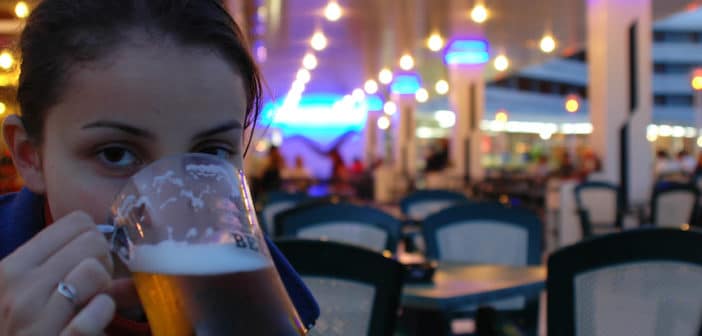 A&E struck gold back in 2005 when they launched the Emmy-winning Intervention, a docu-style series following alcoholics, drug addicts and those struggling with other disorders from the depths of their addictions through a staged intervention and, if all goes well, off to treatment. Though briefly canceled in 2013, the show was revived just a year later and is now continuing its 15th season. This week’s episode aired as the 20th episode of Season 15 on Sunday, August 28th.
A&E struck gold back in 2005 when they launched the Emmy-winning Intervention, a docu-style series following alcoholics, drug addicts and those struggling with other disorders from the depths of their addictions through a staged intervention and, if all goes well, off to treatment. Though briefly canceled in 2013, the show was revived just a year later and is now continuing its 15th season. This week’s episode aired as the 20th episode of Season 15 on Sunday, August 28th.
This is Sarah
Growing up in Trenton, Ontario, Sarah was a happy child who developed into a troubled pre-teen after a classmate called her fat; somehow that one comment turned a switch in her and she became obsessively insecure and self-conscious about her weight. By the time she was a teenager, Sarah was not only diagnosed with anorexia but also cutting herself. Though she eventually returned to a healthy weight, Sarah’s world was turned upside down again when, during a class trip to Japan, a tsunami struck and cut the trip short. Though she escaped disaster, Sarah returned home to her own tsunami of anxiety and guilty, causing her to relapse into drinking and self-harm.
Now, years later, excessive alcohol abuse, pot smoking and cutting has landed Sarah in a motel in where she lives with her co-addicted boyfriend, Kole. Whenever possible, she gets high and drinks herself into a blacked-out stupor, causing the people in her life to fear her imminent death.
What It Was Like
For all intents and purposes, Sarah comes from a “normal” family. She grew up with two loving parents, Len and Sonia, and a younger brother, Brian, with whom she was incredibly close. Sonia recalls that the two were inseparable and that Sarah really looked out for her brother. “Sarah was really good,” Len says, “until about high school.”
Though her pre-teen years were marked by her eating disorder and cutting, by the 12th grade, things were much better. Sarah began eating normally again, returned to a healthy weight, brought her grades up, set goals for herself and always made sure she was on top of them. She even saved up enough money to join her senior class on a trip to Japan. “She wanted to experience the world,” her mom says.
What Happened
A few days into the trip, on March 11, 2011, a 9.0 magnitude earthquake and subsequent tsunami hit Japan. Though no one from Sarah’s school was injured, the trip was cut short and the class returned to Canada. At first, Sarah was really upset and angry that the much-anticipated trip had been cancelled but when she learned what had happened, she felt immediate remorse and shame for reacting the way she did. She soon began drinking and cutting herself again to cope with the guilt she carried—both for being selfishly upset and for having survived.
After the trip to Japan, Sarah began drinking before, after and even during school. Crazy stories about her weekend behavior began circulating the school and getting back to her friends, causing them to worry. “Yeah, it was bad,” her friend Allison recalls.
Though Sonia said her daughter was good at hiding her problems, by the time Sarah was in college, they had become too big to ignore. “She’d call me in the middle of the night, completely annihilated and not know where she was,” her mom says. Brian went up to visit her several times where he saw her drink so much that she puked, then continue drinking until she puked again and so on. Sarah started getting arrested and then attempted suicide and ended up in the hospital as a result of her drinking.
Right before she was about to graduate, Sarah got a DUI for driving on the wrong side of the road, speeding and trying to out run the cops. Sonia decided that this was the final straw so she pulled her out of school and made her move home. “She [Sonia] figured she’d fix her,” Sarah’s grandmother says. “She’d take her out of school, bring her home and [it would]stop her drinking. It didn’t.”
Shortly after, Sonia and Len divorced, in part because of Sarah’s drinking, and Sarah moved in with her dad and Brian. Eventually, after she’d ignored multiple warnings not to bring alcohol into the house, Dad kicked her out. “I’m not giving her any money, I’m not giving her a place to stay, I’ve cut all ties,” her dad says.
What It’s Like Now
Though she’s described as outgoing, happy and “everyone’s best friend,” this isn’t the Sarah we see. She and her boyfriend Kole (who doesn’t even have the decency to spell his name with a C) are living in a motel as they await trial for her second DUI and the two seem more like they are holding each other hostage than in a romantic relationship. Though Kole claims that they only fight over one thing—booze—their arguments often escalate and get physical. We learn that Kole’s dad was an alcoholic (no shocker there) and that seems to explain their dynamic but also aggravate it, as Kole both enables Sarah and resents her.
Not afraid to admit that she brings people down the rabbit hole with her, Sarah says that Kole has been drinking a lot more since he started dating her. But, conveniently for Kole, any issues he has are greatly shadowed by Sarah’s addiction.
On a given day, Sarah drinks up to 12 beers or 40 ounces of vodka, often switching off between the two. Apparently, “beer before liquor, never been sicker” are words of wisdom that don’t apply to Sarah as she might get blotto but we never actually see her vomit. However, Sarah admits to having constant headaches, stomach pains and waking up in the middle of the night in cold sweats.
Though convinced her daughter is going to die any day, Sonia is Sarah’s biggest enabler. Sarah will beg, plead and make promises she can’t keep just so her mom will buy her one more bottle. And sadly, Sonia always does even though she admits she knows it will be gone in a matter of hours.
The Pre-Intervention
Canadian interventionist Maureen Brine meets with Sarah’s family: Sonia, Len, Brian and their grandmother, as well as Kole and Allison. “Like most families, you have done everything you know how to do,” Brine says and assures them that by doing the intervention, they are doing right by Sarah.
Brine asks if the family can pinpoint what the pain underneath Sarah’s drinking might be. Sonia and Len talk about the change they saw in their daughter when she returned from Japan. They talk about how traumatizing it was for her—not just the incident itself but the fact that, unfortunately, the media outlets used her photo in stories about how her class escaped the disaster. Brine points out that for someone who is already self-conscious, that must have been very painful for her.
Len adds that while that might be at the root of it, there are so many more losses that have been piled on top of it. “The losses due to alcohol—like the schooling, the car, a job,” he says.
“Her family,” Brine adds, referring to the estrangement between Sarah and her dad and brother.
“Can she point fingers at any of you for your alcohol or drug use?” Brine asks. Kole immediately acknowledges that he will have to make some drastic changes. “You can’t be sitting down at a table with her, drinking and smoking pot,” she tells him. “Because once the brain is addicted, it’s addicted.”
Brine goes on to explain the deal any Intervention obsessive knows well—that everyone has to write a letter in which they state their bottom lines, explaining what they’ll take away if Sarah refuses to get help. Sonia says that she doesn’t know what her bottom line will be because she doesn’t know how to say no to Sarah when she needs help. Brine explains to her that the only way she will be able to help her daughter is by cutting her off. Sonia admits that she doesn’t know if she can do that.
The Intervention
When Sarah opens the door to her “final interview,” she is definitely surprised to see her family and friends on the other end. She hesitates a moment, almost unwilling to enter the room, but Brine greets her warmly and ushers her in, reminding her that the people in her life love her.
Len is the first one to read his letter. “Over the last three years, I have watched my beautiful, smart girl struggle with reality,” he says. “I want nothing more to have my Sarah back.”
Next is Allison, who reminds Sarah how much she misses the friend she used to be. Kole’s letter talks about how he wants to start a family, which seems wildly inappropriate considering what we have seen of their life together but whatever, the dude’s trying and tells Sarah he thinks she would make a great “mommy” (ew!).
Sonia uses her letter to confess that, as a mother, she wants to love and protect her daughter but that she has perhaps gone overboard. “My heart and soul are exhausted,” she says. “If you do not accept this help, I will have no choice than to support your dad and your brother in not supporting your addictions any longer.” Go Sonia!!
Brine presents Sarah the offer to go to treatment at Orchard Recovery Center for 90 days. “That’s a long time,” Sarah says. But Brine points out that in the scheme of life, it’s a very short time. She reminds Sarah that it took her a while to get to where she is and to arrive at a healthy place isn’t going to happen overnight. Sarah takes a moment and then says, “I’ll go.”
But the intervention takes a surprise twist when Brine turns to Kole and offers him treatment for codependency. He promptly accepts. “I’ll do anything it takes,” he says.
Three Months Later
At the end of her 90-day program, Sarah looks dramatically different. She has lost the black gothic eye make-up and some drinking weight—looking much healthier and physically fit. She seems proud to be sober and her counselors comment on how much her attitude about sobriety has changed since she arrived.
“I’ve never read a book in my life and have started reading,” Sarah says. She has also discovered that she loves to write; she wants to go back to school and travel.
After Sarah completed the program, she moved back in with her mother and has been sober since April 3, 2016.
Kole decided to take a job working in the oil fields in Alberta but intends to start the codependency program when he returns.
Sponsored DISCLAIMER: This is a paid advertisement for California Behavioral Health, LLC, a CA licensed substance abuse treatment provider and not a service provided by The Fix. Calls to this number are answered by CBH, free and without obligation to the consumer. No one who answers the call receives a fee based upon the consumer’s choice to enter treatment. For additional info on other treatment providers and options visit www.samhsa.gov.




